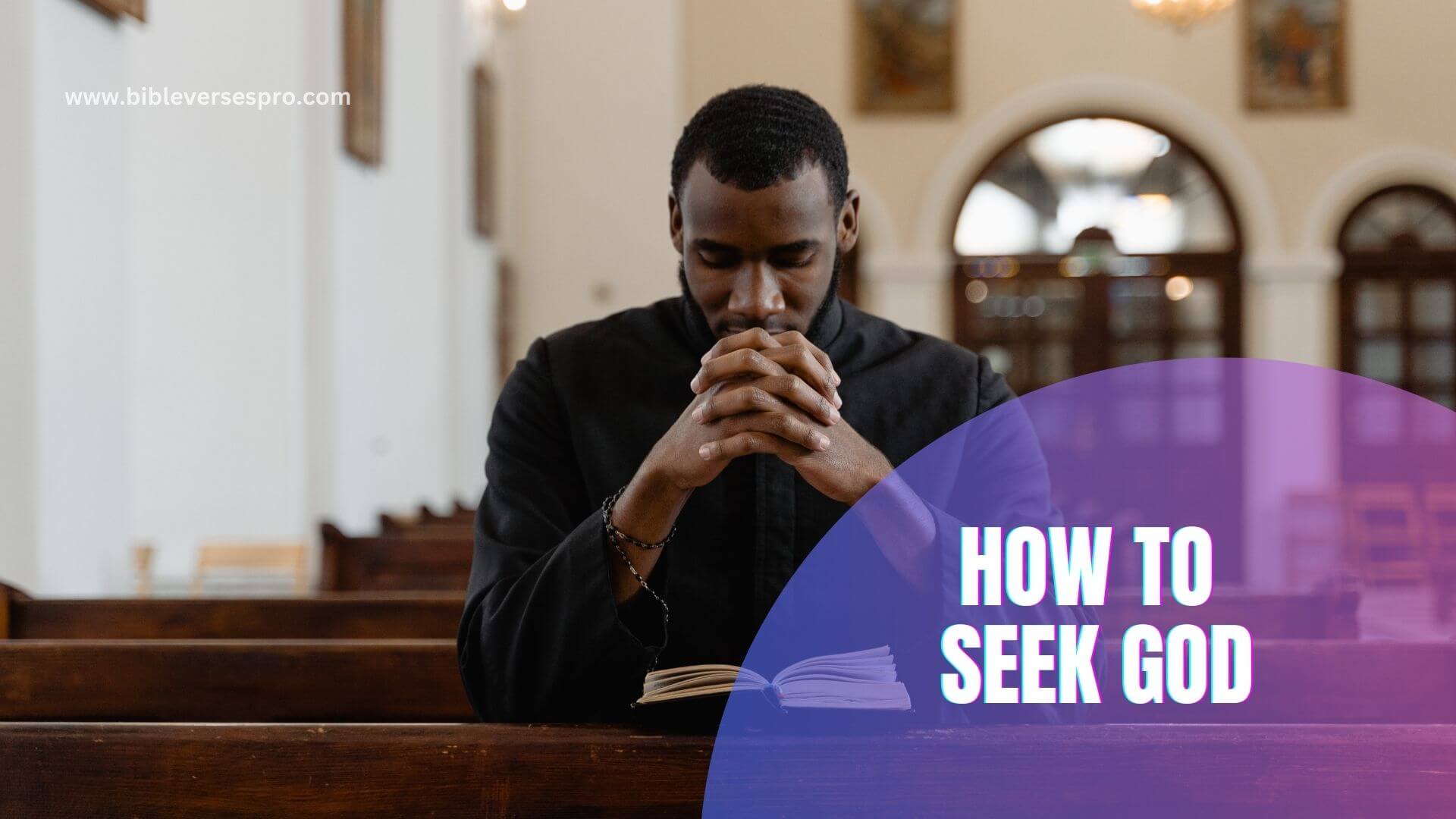Pursuing spiritual meaning and a relationship with a higher power is a basic human need.
Many people turn to religion, meditation, or other forms of spirituality to find that connection.
While seeking God can be complex, it can also be profoundly fulfilling and transformative. We shall look at how to seek God in this article.
What Does Seeking God Mean?
To seek God is to seek a more profound spiritual relationship or understanding of the divine.
Prayer, meditation, and studying holy texts are practices in searching for God.
It frequently entails trying to live a moral and upright life by the precepts and teachings of one’s faith.
Regardless of religious beliefs, “seeking God” can also refer to the search for transcendence, meaning, and purpose in life.
It can entail learning about various spiritual traditions, reflecting on oneself, participating in introspection, and developing awe and wonder for the cosmos.
We must be willing to investigate and connect with the divine in whatever way feels genuine and essential to us to pursue God successfully. This is a very personal and individual process.
How To Seek God
Seeking God requires a lot of introspection and personal work. There is no right way to seek God, and everyone’s journey will be unique.
But by cultivating curiosity, engaging in mindfulness exercises, reading religious texts, seeking out a community, giving to others, etc. We can truly find him.
Develop a sense of wonder and inquiry.
Cultivating an interest in and wondering about the world around you is one of the first steps in seeking God.
This may entail looking into the natural world, science, the arts, or other facets of human society.
You can get a deeper understanding of the wonder and complexity of the cosmos by being open to different experiences and viewpoints.
Practice Being Mindful
Being present and conscious of your thoughts, feelings, and environment is the practice of mindfulness.
It can assist you in forging a stronger bond with your inner self and the outside world.
Meditation, breathing exercises, or simply pausing to pay attention to your sensations and environment can all be part of practicing mindfulness.
Regular mindfulness exercises can help you develop a stronger connection to the divine within and around you.
Read The Holy Books
For searchers, sacred writings offer direction and knowledge. Reading and considering these works can be a potent method to expand your spiritual awareness, regardless of whether you are drawn to the Bible or other spiritual writings.
As you read, consider what ideas and messages resonate with you and how they relate to your life.
Locate A Spiritual Community.
Finding a group of people who share your beliefs can be crucial in seeking God.
Opportunities to interact with people and gain knowledge from their experiences can be found by attending services, joining a meditation group, or participating in a spiritual retreat.
Sharing your journey with others might also provide new perspectives and ideas you might otherwise not have found.
Assist Others
Through deeds of kindness and compassion, serving others is a way to establish a spiritual connection.
Serving others can help you develop a sense of empathy and thankfulness, whether by working at a soup kitchen, visiting the sick, or being receptive to a friend in need.
Additionally, it can assist you in finding meaning in your own life and a connection to a greater purpose.
Accept Uncertainty
Finding God is not always an easy task. Uncertainty, skepticism, and doubt may be present. Accepting these facets of the journey can be a potent means of developing and expanding your spiritual knowledge.
Accept the unknown and believe the road will reveal itself in its own time rather than attempting to force certainties or solutions.
Demonstrate Gratitude
A strong habit like gratitude can help you develop a sense of appreciation for all the blessings in your life.
You can increase your sense of contentment and tranquility by concentrating on what you already have rather than what you don’t.
Prayer, journaling, or simply taking a few minutes each day to think about everything right in your life are all ways to express gratitude.
Ask for advice
It can be beneficial to seek advice from a spiritual mentor, teacher, or counselor to obtain understanding and support for your spiritual path.
A reliable advisor can be a sounding board for your thoughts and insights while navigating challenging questions or challenges.
They are finding someone who can help them on their path, whether a pastor, rabbi, imam, or spiritual coach, can be a helpful resource.
In summary, seeking God takes a lot of self-reflection and individual effort. There is no right way to pursue God; every person will have a different journey.
But by developing curiosity, practicing mindfulness, reading holy books, looking for community, helping others, embracing uncertainty, expressing gratitude, and looking for guidance, you can gain more insight into how to seek God.
7 Steps To Seeking God
A person’s journey to find God can significantly impact their life.
You may take steps to assist and guide you, whether looking for a deeper understanding of spirituality, hoping to build a relationship with God, or simply examining your ideas.
The following are seven steps to seeking God:
Step 1: Pray
A crucial component of pursuing God in prayer. It lets you express your aspirations, concerns and wishes to the Lord.
Set aside time each day for prayer, whether you ask for wisdom, courage, or forgiveness.
Locate a calm setting where you can concentrate on your thoughts and establish a spiritual connection.
Step 2: Study The Bible
The Bible is invaluable for those looking for God, offering direction, insight, and divine knowledge.
Make it a routine to read and study the Bible regularly, regardless of your reading.
Spend time thinking about what you’ve read and how it relates to your life.
Step 3: Go To Worship services
Participating in worship sessions is another crucial stage in the search for God. It enables you to communicate with people with similar values and gain knowledge from spiritual authorities.
Make it a point to consistently attend your place of worship, whether a church, mosque, synagogue or another.
Participate in your religion’s customs and rituals and pay attention to the teachings of your spiritual leaders.
Step 4: Show Gratitude.
A crucial component of pursuing God is cultivating appreciation. It assists you in maintaining a good outlook on life and developing gratitude for the benefits you have been given.
Whether it’s your health, family, or faith, take time each day to reflect on everything you are grateful for.
Your spiritual journey will become more prosperous and more meaningful if you learn to cultivate gratitude.
Step 5: Help Others
Finding God requires one to serve others. You may put your religion into practice and alter the world for the better this way.
Find opportunities to assist others frequently, whether through charitable giving, volunteering at a neighborhood charity, or simply lending a hand to a friend.
Your relationship with God will deepen, and you’ll gain more empathy and compassion.
Step 6: Practice Meditation
For anyone looking for God, meditation is a great tool. You can relax and make spiritual connections while doing this.
Make it a habit to meditate frequently, whether you employ mindfulness, visualization, or another type of meditation.
Allocate some time daily to relax, concentrate on breathing, and establish a spiritual connection.
Step 7: Work On Forgiving Others.
Forgiveness is a crucial component in the search for God, and it lets you let go of unpleasant feelings and develop compassion and peace.
Make it a point to routinely practice forgiveness, whether asking for forgiveness from others or seeking it from yourself.
It will help you grow in love and acceptance while drawing you nearer to God.
Benefits Of Seeking God
Seeking God is a personal experience that can benefit each person.
There are some universal advantages that many people encounter when they begin this path, even if the advantages of pursuing God may differ from person to person.
The following are some advantages and benefits of seeking God:
Sense Of Meaning And Purpose
Many people who turn to God claim a stronger sense of meaning and purpose.
People can discover direction and purpose by turning to God, who can offer a framework for addressing life’s significant concerns.
Greater Sense Of Inner Tranquility
Increasing inner peace can result from seeking God. Many people who seek God claim to feel more at ease, grounded, and centered.
This can be especially useful in trying times because it can make people more resilient when facing life challenges.
Better Emotional And Mental Wellness
The pursuit of God can be beneficial for one’s mental and emotional well-being.
According to studies, people who practice spiritual activities like prayer and meditation may have fewer symptoms of sadness and anxiety, better-coping mechanisms, and more extraordinary emotions of well-being.
Sense Of Belonging
Many believe that pursuing God entails joining a group of others who share their beliefs.
This might be especially helpful for those who experience social isolation or a sense of being cut off from others.
A sense of community, support, and friendship can be found by joining a faith-based organization.
Increased Empathy And Compassion
Individuals who seek God may also grow in their capacity for empathy and compassion.
Many religious traditions stress the significance of showing kindness and compassion to others.
People may become more altruistic and service-oriented as a result of this.
Enhanced Connections
Many persons who seek God claim that their interpersonal relationships have also improved.
Various things, such as heightened empathy, enhanced communication abilities, and a more substantial capacity for forgiveness and understanding, may cause this.
Enhanced Resiliency And Coping Mechanisms
Last but not least, turning to God can help people become more resilient and cope.
People may be better able to endure life’s obstacles and overcome misfortune if they cultivate a feeling of purpose, inner calm, and connection to others.
Conclusion
The journey of seeking God is profoundly personal and important and has the power to improve our lives and offer us immense joy.
We can expand our spiritual knowledge and establish a connection with a greater power or force that extends beyond our own lives by cultivating curiosity
engaging in mindfulness practices, reading sacred texts, looking for community, helping others, facing ambiguity, expressing gratitude, and seeking guidance.
Remember, there is no right way to pursue God; everyone will take a different road.
Accept the journey as a lifelong process that can lead to great reward and growth in the search for spiritual meaning and connection.







